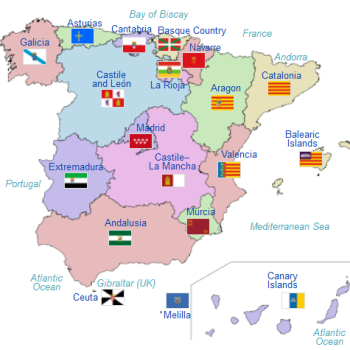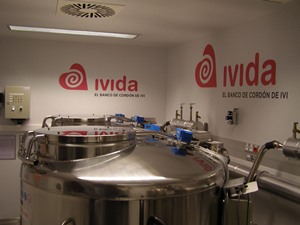Você está aqui
CORD BLOOD BANKING IN SPAIN: Public, Private, and Cross-Over from Private to Public
 Spain is a "funny" country from the private cord blood banking perspective, let me explain: Spain has a decentralised health system comprising 19 regions (Autonomous Communities), that each regulates their own hospitals. Some regions are as small as a city, for example Ceuta or Melilla. Each region has its own health competence or "ministry" that operates its own accreditation system. It is probably difficult to understand that a country with a size in square meters between Florida and Texas has such a complicated health structure. This political organisation comes down from the cultural and political idiosyncrasy in Spain. So having explained that let me explain the legal status of private cord blood banking in Spain.
Spain is a "funny" country from the private cord blood banking perspective, let me explain: Spain has a decentralised health system comprising 19 regions (Autonomous Communities), that each regulates their own hospitals. Some regions are as small as a city, for example Ceuta or Melilla. Each region has its own health competence or "ministry" that operates its own accreditation system. It is probably difficult to understand that a country with a size in square meters between Florida and Texas has such a complicated health structure. This political organisation comes down from the cultural and political idiosyncrasy in Spain. So having explained that let me explain the legal status of private cord blood banking in Spain.
![]() Cord blood regulations in Spain
Cord blood regulations in Spain
Currently, the national legislation which comprises how we do private cord blood banking in Spain is the Real Decreto-Ley (Order in Council) 9/2014 dating from 4 July 20141. This regulation is an adaptation of the European Union (EU) Directive 2004/23 regulating human cells and tissues that was passed by the European Parliament and Council in March 2004. The EU subsequently passed Directive 2006/17 on 8 Feb. 2006 and the Directive 2006/86 on 24 Oct. 2006 to enforce the technical requirements of the original directive.
Cord blood regulations in Spain started back in 2006 (Royal Decree 1301/2016 of 10 Nov.) and are basically the same as the EU. While this regulation applies to all Health Regions in Spain, the various health competences within each region may apply and interpret the rules without interference from the national Ministry of Health.
To summarize cord blood regulations in Spain:
- The European Union establishes a common position on a given area.
- The EU member countries then decide how to enforce the EU position. In Spain the EU position has been adopted as the current rules.
- In Spain, the independent Health Regions can do the following:
- Increase (never decrease) the scope of the regulation
- Do nothing and use the National Law
![]() Cord blood facilities in Spain
Cord blood facilities in Spain
Our legislation discriminates between a "Collection Centre" and a "Tissue Bank", each having different ways of getting their accreditation in their own health region.
In Spain there are 7 public cord blood banks and also 213 hospitals, both public and private, that are accredited for public donation2. There are 2 private cord blood banks in Spain with full licenses for processing and storage (IVIDA and VidaCord) and another 2 with just the processing authorisation (Sevibe Cells and Stem Cell S.A.).
So the reader may ask: is it possible for Spanish families to collect and store their cord blood privately? The answer is: it depends.
![]() Cord blood storage in Spain is never fully private
Cord blood storage in Spain is never fully private
Let's go again into basic aspects of our "funny" situation. IVIDA is a private cord blood bank that has a full license, so in theory families could form a contract with IVIDA to store their child's cord blood. But this has some limitations.
Under the national regulations of Spain, any cord blood unit banked within our country must submit to compulsory declaration of the HLA (human leukocyte antibody) type on an international registry. Hence, every cord blood unit stored in Spain is listed on the international registry as a potential public unit in case it matches a patient in need.
Hence, fully private banking is not an option in Spain. To accommodate those families who wish to store privately, all the cord blood banks working in Spain offer final storage facilities in another country where private cord blood banking is allowed. For this reason IVIDA has a second facility in Portugal.
Regarding the question on whether is it possible for Spanish families to collect and store their cord blood privately, let's go to collection.
![]() Cord blood collection in Spain - theory versus practice
Cord blood collection in Spain - theory versus practice
In theory, under the national law, the only requirement for families to have their child's cord blood collected is for a signed agreement to be in place between the "collection centre" and the "tissue bank". Such an agreement would specify the preparation of the collection kits, the kit custody within the hospitals, the ability to trace the kit as it is transported, etc.
But out of the 19 autonomous health regions in Spain, there are only 4 in which collection of cord blood for private storage is allowed. In those regions collections may take place in either a public or private hospital that is accredited as a "collection centre".
In the remaining 13 health regions, private cord blood banking is prohibited in public hospitals, either because there are no specific regional regulations regarding private cord blood collection, or it is not allowed without official explanations to the banks or to the families. This is a bit strange since there are many hospitals within these regions which are accredited as "collection centres". But families in these regions cannot get their child's cord blood collected for a private bank because their health authorities deny or even ban private banking, although theoretically, the only bureaucratic issue is to have an agreement signed between the cord blood bank and the hospital..

![]() Our cross-over from private storage to public release
Our cross-over from private storage to public release
IVIDA sends more than 99% of the cord blood we collect for client families to our facility in Lisbon (Portugal), for private-only storage. Yet we have a number of cord blood units which are stored privately in Spain, and therefore available to the Spanish Transplant Organisation.
In April 2014 we received a request from the national registry in Colombia to confirm the test results for one of the private cord blood units stored in our facility in Madrid. The unit had been banked by a Spanish family in Feb. 2013 and was an HLA match for a patient in Colombia who needed a stem cell transplant for acute lymphoblastic leukaemia.
When we told the parents that their child's cord blood had been requested for a patient, instead of deciding to send this unit straight away to Lisbon (which was their legal right in the contract), they still decided to donate the unit to this sick person.
After we provided the quality report on the unit (identification, id registry, HLA type, demographic information, processing information, processing results and maternal blood testing for infectious disease markers), the unit was formally requested and was sent to Colombia in May 2014. The patient received the cord blood transplant in July.
This was our first experience where a private cord blood unit was requested for a patient and made the cross-over to be released as a public unit. IVIDA decided to reimburse the family on all their expenses. IVIDA performed and paid for all the testing that was required to release the unit. It is important to highlight that at IVIDA we routinely do these tests with all the samples, except for the confirmatory HLA typing which only takes place if there is a request to release a unit for therapy.
![]() Conclusions & future plans
Conclusions & future plans
So this story shows you why we claim that the situation of the cord blood industry in Spain is a bit "funny". There are private banks in Spain, like IVIDA, but even though we have invested in facilities within the country, we had to invest outside Spain to be able to have the cord blood units of our families privately held. Moreover, in some regions we can operate normally, with the control and acquiescence of the Regional Health Authorities (both public and private Hospitals) while in other regions our activity is either non-regulated or even banned! IVIDA together with other cord blood banks in Spain are working together to try to develop a standard legal practice across our Health Regions.
References:
- Real Decreto-Ley 9/2014
- National Transplant Organisation, ONT



